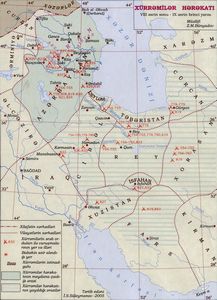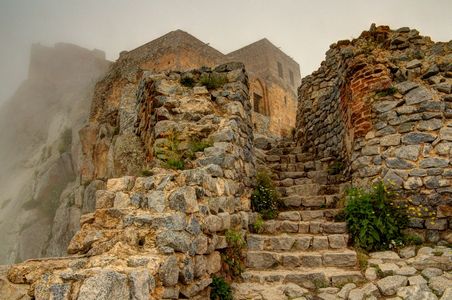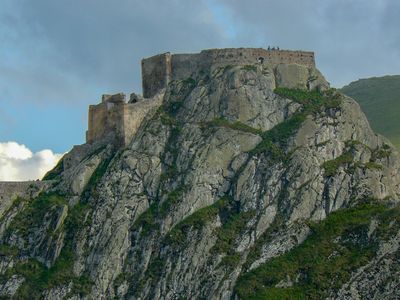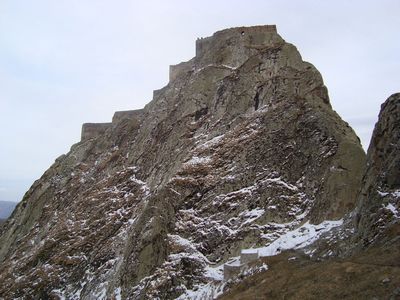UPRISINGS AGAINST ARAB RULE IN AZERBAIJAN. THE WAR OF FREEDOM LED BY BABEK
The resettlement, land and robbery and heavy tax policy pursued by the Caliphate in Azerbaijan caused the rightful dissatisfaction of all segments of the population.
In the middle of the eighth century, strong popular dissatisfaction with Arab rule turned into revolts. The revolt that began in Beylagan in 748 under the leadership of the local ayan Ibn Safwa spread to Ardabil and Barda. All sections of the people took part in the uprising. The rebels destroyed the Arab garrison in Barda and killed the successor of the Caliphate. The punitive army sent by the Umayyads was defeated. The Abbasids, who replaced the Umayyads, ruthlessly suppressed the revolt and crushed the rebels. The uprisings in Shamkir in 752 and in Ardabil, Shirvan and Aran in the 1990s were brutally suppressed by sending a large army.
The greatest liberation struggle against the caliphate is considered to be the speeches of the "Khurrams". In history, the concept of "date" is interpreted differently. Most scientists associate this concept with fire and sun. The medieval Azerbaijani philosopher Shahabaddin Suhrawardi wrote that the concept of a date means "spiritual, divine light". The first movement began in 778. The second speech of the Khurrams in 808 was suppressed by a 10,000-strong Arab army sent by Harun al-Rashid.
According to Arab sources, after the death of Javida, the leader of the Khurrams in 816, a man named Babek "appeared on Mount Bazzayn in the province of Azerbaijan and the number of his supporters increased ...". All the forces dissatisfied with the Arabs - Khurrams, Christians and even Muslims - gathered around Babek. In Arabic sources, "Babek's country" means "Bazz, Azerbaijan, Arran and Beylagan." Babek had a large force of more than 300,000 people. As a result of his victory in the battle in 823/824, Babek liberated Barda, Ardabil, Nakhchivan, Beylagan and Shirvan and appointed his comrade-in-arms Rustam as the ruler of the northern lands of Azerbaijan - Aran. In 829, Babek defeated an army of 150,000 led by a prominent Arab commander, Muhammad al-Tusi, at the Battle of Hashdadsar near Maragha, and the Arab commander was killed. Later, Babek severely defeated several Arab armies. In 830, Babek captured Hamadan and took a very important strategic route connecting the Abbasid capital, Baghdad, with Central Asia and the Caucasus. As a result of this victory, all the lands of Azerbaijan were cleansed of Arabs.
The heavy defeat of the caliph's armies, the loss of a very important territory like Azerbaijan, and the fact that Babek's victories strengthened the people's liberation movement in other regions frightened Caliph Mamun. The Arab historian Masudi wrote: "The Babek movement reached such a great level that its influence and the number of its troops increased so much that the Abbasid kingdom was about to be destroyed."
Caliph Mutasim was able to turn the tide of the war with Babek at great expense and power. In 833, in the second battle of Hamadan, Babek was severely defeated. The caliph appointed a talented commander in the war with Byzantium in Egypt, the Turkish Afshin Heydar ibn Kavus, as the commander of the troops fighting against Babek. In one year alone, the caliph spent 1 million dirhams on the war with Babek. As a result of heavy fighting, Afshin managed to squeeze the palms and approach Bazza. The Arabs used the siege to capture the fortress of Bazz. As a result of the betrayal, Babek was taken prisoner. After the Battle of Bazz, a letter arrived from the caliph to pardon Babek. However, Babek categorically rejected this proposal and wrote: "... It is better to live one day as a leader than to be a slave with 40 years of humiliation." Babek's endurance and heroism during his execution in 838 amazed everyone.
The war of liberation led by Babek against the Caliphate is one of the brightest pages in the history of Azerbaijan. Babek had weakened the Caliphate in a 20-year war with the Caliphate, the world's most powerful state on three continents. Babek's war paved the way for the liberation of Azerbaijani lands from the Caliphate in the second half of the ninth century.



